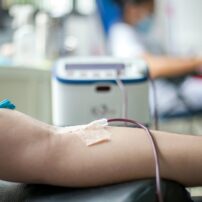 Depression in older adults is a serious concern. The National Institute of Mental Health considers depression in the elderly to be a major public-health problem. It is estimated that in the United States, 6 million persons aged 65 and older suffer from depression, yet just 10 percent of those seniors are being treated.
Depression in older adults is a serious concern. The National Institute of Mental Health considers depression in the elderly to be a major public-health problem. It is estimated that in the United States, 6 million persons aged 65 and older suffer from depression, yet just 10 percent of those seniors are being treated.
Seniors are especially susceptible to depression when they are dealing with chronic health conditions or their own limited functionality. Compounding the problem is misdiagnosis by healthcare providers, who commonly mistake the signs of depression in the elderly as a natural reaction to illness or the normal changes in life that come with aging. Many older adults hold this same belief about their symptoms of depression, which further deters treatment.
Depressed seniors have an increased risk of cardiac disease and it can reduce their ability to rehabilitate. For these reasons, should you suspect an elderly loved one you know is experiencing depression, you must address the situation promptly.
Here are some tips for doing just that.
Know the signs of depression.
Aside from feelings of sadness and anxiety that last for weeks on end, depressed people often feel hopeless, helpless, irritable and restless. They may also exhibit a loss of interest in activities they once found pleasure in and experience increased fatigue or sleep problems.
Difficulty concentrating and making decisions, and suffering aches, pains, headaches, cramps and digestive problems that seem unresolvable are also signs of depression.
Understand the causes.
Depression in older adults is commonly caused by health problems, both directly and as a psychological response to illness or disability. It can also be attributed to loneliness and isolation, a reduced sense of purposefulness, anxiety about the future or enduring grief over the loss of a loved one.
Prescribed medications, particularly when multiple medicines are in play, can also produce depression. This is true for all people, but seniors are extra susceptible because they metabolize medications at a slower rate.
Seek diagnosis and treatment — together. Take a proactive step to heal your loved one by offering to take them to a healthcare provider to address their depression. Multiple treatments are available and all should be seriously considered to ease their suffering.
Show them you care.
There are lots of ways to personally support a senior battling depression. First and foremost, help them manage their treatment. If antidepressants are prescribed, help them monitor their doses as needed and ensure they maintain a healthy diet with some light exercise.
Encourage regular social interactions, whether it’s family gatherings or community events. Consider a manageable pet to instill a sense of purpose — or even a small, flowerpot herb garden.
Never forget that your kind words and frequent hugs are meaningful gestures that demonstrate you care.
Being depressed is not a normal state for anyone of any age. For seniors, it is especially dangerous and cannot be ignored. Quickly address any signs of depression you see with your elderly loved one to help bring the light of life back into their heart and mind.























